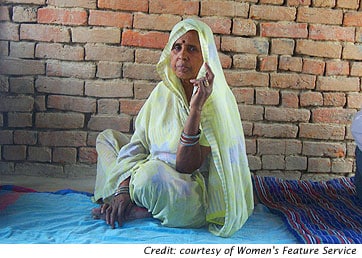
 JALAUN, India (WOMENSENEWS) Small, tin-doored toilet units are the hallmark of a sanitation revolution here in this village in the neglected region of Bundelkhand.
JALAUN, India (WOMENSENEWS) Small, tin-doored toilet units are the hallmark of a sanitation revolution here in this village in the neglected region of Bundelkhand.
Its leader is 65-year-old Mula Devi.
She modestly uses one end of her nylon sari to cover her face in the presence of any male, but she is bold about her cause. "People tease me and say that every toilet door should carry my photograph, but nothing would make me more proud," she says with a smile.
Mula Devi’s leadership began about 15 years ago, when a nongovernmental advocacy group, the Parmarth Samaj Sevi Sansthan, based in the neighboring town of Orai, began grassroots interventions in the region.
One idea it brought was for people to set up self-help group that could initiate tiny businesses.
In Mula Devi’s group of 12 people each one began depositing about $50 each until they had enough money to start a so-called bangle business.
"This was how I could get my four sons and one daughter settled in life," Mula Devi recalls. "They are all married now!"
Sufia Begum, a coordinator for Parmarth Samaj Sevi Sansthan, says sanitation was not among the first priorities of Bhimnagar’s residents and open defecation was the way of life.
Few local women were willing to broach such an issue in a village meeting. Less off-putting issues –such as water storage–came up first.
"Children would run in from the playing field for a glass of water, and dip their tumblers into the drinking water pot with their dirty hands, contaminating the entire pitcher," recalls Mula Devi. "So we talked about the importance of keeping long-handled dippers, so that people could pour out a glass of water without bringing their fingers into contact with it."
Her exposure to the outside world encouraged Mula Devi to consider her surroundings with new eyes. She saw pools of stagnant water, children defecating outside their homes, overflowing sewers. She listened to presentations on water safety.
Understanding the Dangers
"Once we realized how dangerous defecation in the open was, how fecal matter could attach itself to our footwear and follow us from the fields into our houses, how it could pollute our water supplies, we decided to change things," says this unassuming public-heath champion.
Mula Devi was older and well respected and when she began to get involved she was able to persuade other local women to speak up.
At first, single-sex meetings just for women were held to encourage the women to speak up.
Nongovernmental groups conducted mass-education campaigns on hygiene. Ditties were composed with lyrics such as these: "Before meals and after the toilet/ Wash hands, wash hands/ Wash hands with soap."
Once Mula Devi realized the public-health importance of toilets, she began talking to members of her community. "I always highlighted the fact that besides helping to maintain sanitary conditions in the village, toilets were crucial for the well-being of women, who otherwise had to wait until dark to relieve themselves in the open," she says.
She also publicized the government subsidies available for toilet construction.
"People used to regard toilets as a needless luxury," she says. "I had to convince them that it was an absolute necessity."
Going Door-to-Door
She went door-to-door with her message. Instead of spending their money on weddings, she told them it was better to save up for a toilet, which would provide the women and girls of the family with a permanent asset. She would sometimes personally oversee a toilet construction project.
Today, more than half of the village’s 200 households have a toilet and Mula Devi is proud to give a guided tour of the narrow lanes where they can be seen.
Mula is now turning her attention to projects that the village’s water facilities need, such as lining the foundations of handpumps with concrete to protect ground water from contamination and developing models to harvest rain water from roof tops.
Since collecting household water consumes so much of the village women’s time, some have used money from their handful of self-help groups to install 22 taps.
Falling water levels are a huge challenge to the drought-prone region, which is why Mula Devi is doing what she can to protect the small pond that lies in the heart of Bhimnagar. "It helps to recharge our wells, but the big problem is that people use it pond as a dumping ground. If they destroy this, we women will have to go further and further away to procure our water for daily needs," she sighs.
Reviving existing water bodies, like this pond, are also on her to-do list.
Would you like to Comment but not sure how? Visit our help page at https://womensenews.org/help-making-comments-womens-enews-stories.
Would you like to Send Along a Link of This Story?
https://womensenews.org/story/leadership/111102/tin-toilets-in-india-mark-village-womans-feat
ATTRIBUTION: This article is adapted from one that was released by the Women’s Feature Service. For more articles on women’s issues log on to: http://www.wfsnews.org.
Anuradha Sahni is a correspondent for Women’s Feature Service, based in Mumbai, India.


